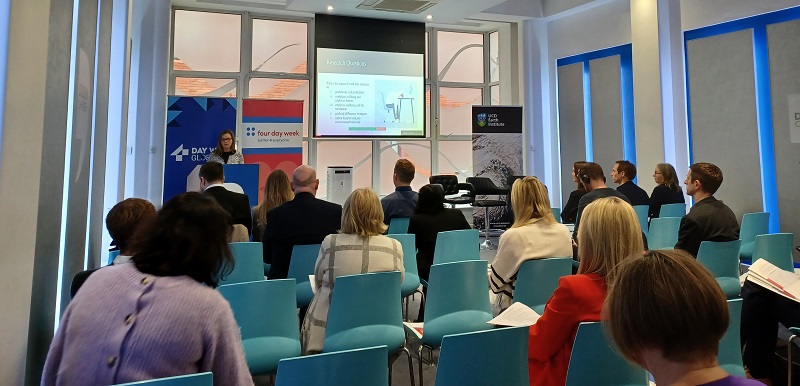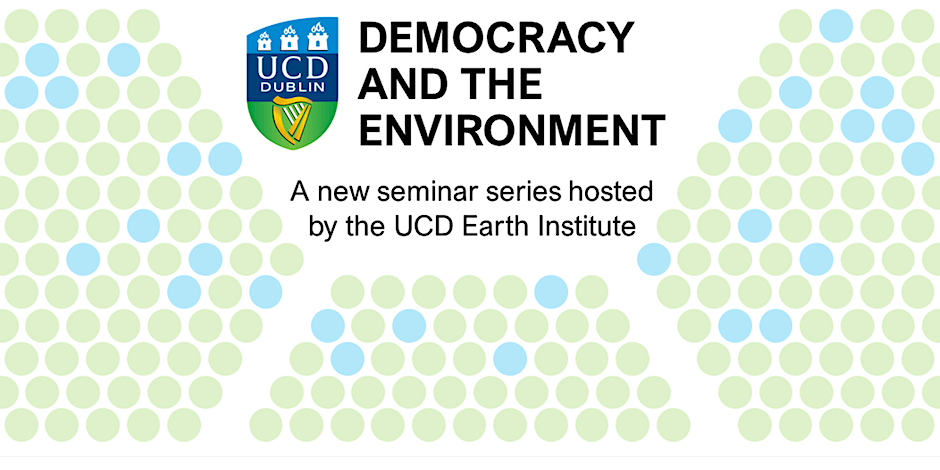Four-day week pioneering pilot program a huge success, research reveals
New research carried out in partnership by Four-Day Week Ireland, University College Dublin (UCD), and Boston College reveals that companies who gave their staff an extra day off per week, with no reduction in pay, experienced increased revenue alongside reduced absenteeism and resignations.
Four-Day Week Ireland have been undertaking a six-month trial to research how the proposed structure might work in Ireland, examining the financial, social, and environmental impact that a four-day working week would have on businesses and employees in Ireland. Earth Institute member Dr Orla Kelly from the School of Social Policy, Social Work and Social Justice has been overseeing the research and the report.

The report launch on the results of this first four-day week trial in Ireland took place on Wednesday 30 November 2022 at the Dublin Chamber of Commerce, supported by the Earth Institute. At the launch event, Professor Juliet Schor of Boston College provided an overview of the results of the international reduced worktime trials that have occurred internationally throughout 2022, noting an important outcome:
“We were encouraged that participants did not experience an increase in the intensity of work. This suggests that the work re-organization strategy succeeded and performance was not achieved via speedup, which is neither sustainable nor desirable,” she said.
Lead researcher Dr Orla Kelly of UCD said that the research can provide key learnings and lessons for the future of work in Ireland.
“All participating organisations plan to continue the reduced work schedule. Productivity levels are up. We found significant improvements across a wide range of wellbeing metrics, including positive affect, work-family and work-life balance, and several domains of life satisfaction,” she explained.
“Conversely, stress, burnout, fatigue and work-family conflict significantly declined. Levels of sleep deprivation have also fallen dramatically. We observed an increase across three forms of pro-environmental behaviour.”
The health and well-being of participants also improved, as Associate Professor Wen Fan of Boston College explained:
“A wide range of well-being metrics showed significant improvement, including stress levels, burnout, fatigue and work-family conflict. Physical and mental health also improved, alongside satisfaction across multiple domains of life which may be linked to people getting better sleep and more exercise,” she said.
The research revealed workers felt less stressed and burnt out, and reported higher rates of life satisfaction. Findings also show significant declines in the duration and frequency of commuting, plus other positive environmental outcomes. None of the participating organizations are returning to a five-day week.
This comes after more than 30 companies and almost 1,000 employees in countries including the US, Ireland and Australia recently concluded a six-month 4 day week pilot program, coordinated by non-profit 4 Day Week Global.
Companies rated the trial a 9.0 out of 10, expressing extreme satisfaction with their overall productivity and performance. Revenue increased by more than a percentage point each month, with a total rise of 8% during the trial. When compared to the same six months in 2021, it rose by 38%.
Employees also rated the pilot highly, with 97% saying they want to continue on a 4 day week. When asked about the monetary value of their extra day off, 70% said their next job would need to offer between 10 to 50% more pay for them to go back to a five-day schedule, with over one in ten saying no amount of money could make them go back.
Speaking about their experience on the trial, pilot participant Jon Leland, Chief Strategy Officer at crowd-funding platform Kickstarter said:
“The 4 day week has been transformative for our business and our people. Staff are more focused, more engaged and more dedicated, helping us hit our goals better than before. Greater employee retention and faster hiring has been surprisingly powerful in driving improved business outcomes too. We're achieving more as an organization, while giving people time to start new creative projects, rest, and be with their families. It's a true win-win.”
Rod Lacey, Chief People Officer at software company simPRO added:
“After transitioning to this new way of working, we found that by truly taking care of our employees, listening to them and showing them that their input and work is valued, it comes back to simPRO everyday by way of dedicated commitment, retention and exceptional customer service and support.”
Reflecting on the journey so far, 4 Day Week Global co-founder, Charlotte Lockhart believes this is only the beginning:
“When our co-founder Andrew Barnes and I first witnessed the benefits of the 4 day week in 2018, we knew we had to share our learnings. The results laid out in this report further prove what we already know and we look forward to expanding this research over the coming months, as other organizations from a range of industries and economies make the switch to reduced-hour, output-focused working. Change is imminent and I commend all involved in this trial for making history happen,” she said.
About Four-Day Week: Ireland
Four Day Week Ireland is a campaign advocating for a gradual, steady, managed transition to a shorter working week for all workers, in the private and public sectors. It is part of the global Four Day Week campaign, an international movement advocating for this change around the world. Four Day Week Ireland is run by a campagin coalition of trade unions, businesses, environmentalists, women’s rights and civil society organisations, academics, health practitioners and global advocates.


